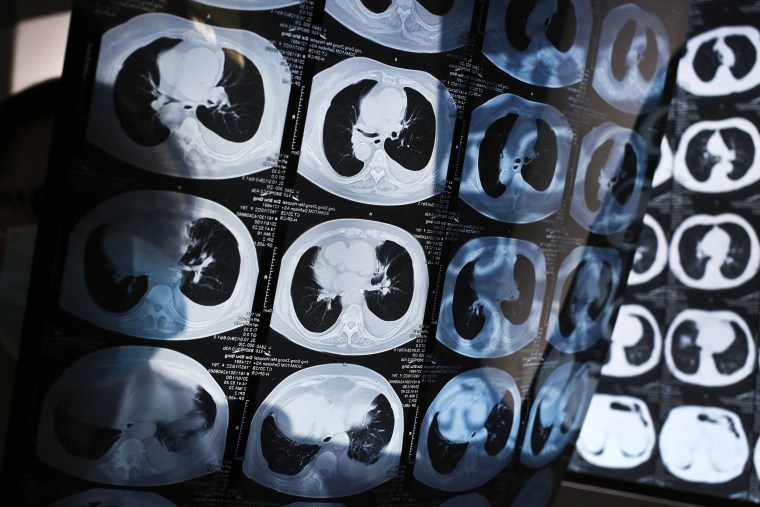Random mutations are the single biggest factor in causing cancer, researchers reaffirmed Thursday.
About two-thirds of the genetic mutations that lead to cancer happen simply because of random errors made as cells divide and not because of diet, chemicals or inherited genes, the team at Johns Hopkins University said.

“We hope that this research offers comfort to the literally millions of patients who have had cancer but who have lived nearly perfect lifestyle — who have never smoked, who have avoided the sun … who exercise regularly,” Dr. Bert Vogelstein of the Johns Hopkins Kimmel Cancer Center told a news conference.
"It's not your fault. Nothing you did or didn't do was responsible for your illness."
And Vogelstein says he really wants to reassure parents whose children get cancer. Most childhood cancer is caused by random mutations, he said.
“They need to understand that these cancers would have occurred no matter what they did. We don’t need to add guilt to an already tragic situation.”
Related: Gene Scan Finds Many Mutations in Kids With Cancer
More importantly, it means everyone needs to be screened for cancer when possible even if they think they’re at low risk because of family history and their own healthy habits, Vogelstein said, because their findings mean everyone’s at risk of cancer, the No. 2 killer in the United States.
"It's not your fault. Nothing you did or didn't do was responsible for your illness."
Vogelstein and his colleague Dr. Cristian Tomasetti caused an uproar in 2015 when they reported this. They said their findings were misunderstood and misreported — they never claimed that most cancer overall is down to random errors. But they went back, double-checked their data, added research on common cancers such as breast cancer, and then checked against information from 69 countries around the world.
Now, they stand by their findings: random mutations are involved nearly two-thirds of the time in 32 cancer types, they report in the journal Science.
“Two-thirds of mutations in cancer are due to (random mutation),” Tomasetti told reporters. “It does not say at all that two-thirds of cancer cases are due to (random mutations).”
Related: Bad Diet in Teen Years Could Raise Breast Cancer Risk
Their research assumes there are three basic causes of cancer:
- Inherited genetic mutations, such as the BRCA genes, which account for about 5 percent of all cancer cases. They call these mutations “H”.
- Mutations caused by the environment, which is defined by scientists as behaviors such as smoking, diet, exercise, sun exposure and also factors outside a person’s control such as chemicals in the water supply. Vogelstein and Tomasetti call these mutations “E”.
- Mutations that occur because cells divide. Each cell division requires the genetic code to be copied and mistakes can occur randomly. These mutations are called “R”.
“Every time a cell divides it makes mistakes. Most of the time these mutations don’t do any harm,” Vogelstein said. “Occasionally, they occur in a cancer driver gene. That’s bad luck.”
Any cancer type generally can be caused by any of the three causes, and for cancer to develop and progress, cells need to have more than one mutation.
“Every time a cell divides it makes mistakes. Most of the time these mutations don’t do any harm."
"You can’t really allocate just one cause to a specific cancer case, because you don’t know where the necessary mutations came from in an individual case. They might have come from any combination of environment, heredity and random replication errors," said Kevin Conway of The Open University in Britain, who was not involved in the research.
“In some patients, the contribution of H or R factors might be high enough to cause all the mutations required for that patient’s cancer, whereas in others, some of the mutations could be due to H, some to R, and the remainder to E,” the Johns Hopkins team wrote in their report, published in the journal Science.
"It is well known that we must avoid environmental factors such as smoking to decrease our risk of getting cancer. But it is not as well-known that each time a normal cell divides and copies its DNA to produce two new cells, it makes multiple mistakes," said Tomasetti.
Related: Obesity May Cause 11 Types of Cancer
That’s why cancer becomes more common as people get older.
One reason random mutation can’t be blamed for most cases of cancer is that common cancer, such as lung cancer, have a heavy environmental factor. Smoking’s one major cause, but so are exposure to asbestos and radon gas. These all fall into the “E” or environment bucket.
But about 35 percent of the mutations involved in lung cancer are also random, the team found.
Vogelstein said the new findings do not contradict the general wisdom that 89 percent of lung cancer cases are preventable. Men who smoke are 23 times more likely than nonsmokers to develop lung tumors, and women smokers are 13 times more likely to.
Related: Half of U.S. Cancer Deaths Due to Bad Habits
So which cancer types are mostly random? Brain tumors, for one, the researchers said, as well as almost all pediatric cancers.
And cancers that affect tissues that are frequently dividing, such as colon cancer, have a high input from random mutation, the Johns Hopkins team found, although diet, smoking and exercise play a big role as well.
Vogelstein and Tomasetti say their findings fit well with the general advice that 40 percent of cancers are preventable if people don’t smoke, if they stay away from the sun’s burning rays or away from tanning beds, if they eat plenty of fruits and vegetables, avoid red meat and exercise regularly.
“Most of the enemies are inside us."
But Vogelstein has come up with a science-fiction scenario to illustrate the random risk.
“Suppose we have taken someone and corrected all of his or her genes so they are perfect,” he said. “Then we go to another planet. We choose one that has a sun that doesn’t emit ultraviolet radiation,” he added.
“There is no industry. No smoking is allowed. Everyone eats kale shakes for breakfast, lunch and dinner. Even on this new planet, our cells will still make mistakes.”
Even under such seemingly perfect conditions, people will eventually develop cancer, he said.
Related: How Much Cancer is Due to Genes?
Vogelstein has another analogy. “Cancer will strike about 1.6 million people in the United States each year and will kill 600,000 of us,” he said. “If that’s not a war, what is?”
And much research is looking for the wrong enemy, he said. “Most of the enemies are inside us,” he said. “They are already here.
He hopes the studies about random mutations will help refocus efforts on finding ways to find and correct them in time.

